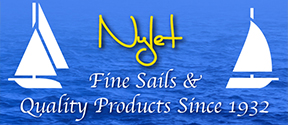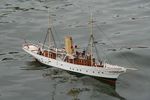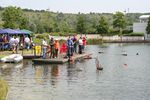Propellers - three blades or four?
The complexity of propeller design
| Colin Bishop | 10/03/2023 17:51:16 |
5438 forum posts 6188 photos 435 articles | I came across this interesting video which highlights the trade offs between different propeller designs. It has implications for our models. Colin |
| ashley needham | 11/03/2023 08:56:27 |
8098 forum posts 194 photos | A good video Colin, easy and succinct. , HOWEVER, in using the Titanic as an example he does ignore the fact that the centre prop in the Titanic was driven by a turbine and not the reciprocating engines on the flanks, and had a higher speed. But the man says the original design called for a centre three blade prop and as there are no pictures we can’t be sure what was fitted initially. Not that I have researched this mind you apart from doing “an amount” of reading. I have a good MM article by the owner of the prop shop (name escapes me) who gave a lot of theory about prop design ,mostly for higher speeds, and said as much as an X series two blade will drive anything at a reasonable efficiency without going into exotica. Obviously the racing boys want ‘ that bit extra’, but the reality is that fancy blades are expensive whereas X series props are about two quid a pop! Ashley |
| Colin Bishop | 11/03/2023 10:34:11 |
5438 forum posts 6188 photos 435 articles | Titanic had a direct drive turbine which is usually associated with small screws to allow it to spin up to speed. A bit like the relationship between an electric motor and prop size on our boats really. Prop design has always been a bit 'suck it and see' because it's not just the effeciency of the design but the way it interacts with other factors such as adjacent bits of the hull and other nearby props etc. Most of the fast ocean liners had problems with their props with four of them in close proximity and the aft ones operating in the flow of the forward ones. This was not just inefficient but uncomfortable as it caused bad vibration aft. The stern of the old Queen Mary and other ships had to be massively strengthened to try to dampen this down. I think the liner SS United States ended uo with a combination of three and four bladed props. The US battleship North Carolina suffered horrendous vibration problems at speed which stopped them using the range finding gear until they came up with a bodge which reduced it to manageable proportions. From a shipowner's viewpoint, just a few percent increase in efficiency can result in worthwhile cost savings. For those of us who run slowish or scale model boats it isn't relevant really. However the performance of one of my boats perked up noticeably when I substituted a four blade prop for the original three blader. It probably pushed current consumption up a bit but not so much that you'd notice. Colin |
Please login to post a reply.
Want the latest issue of Model Boats? Use our magazine locator link to find your nearest stockist!
 Make sure you never miss out on the latest news, product reviews and competitions with our free RSS feed
Make sure you never miss out on the latest news, product reviews and competitions with our free RSS feed

We welcome well written contributions from Website members on almost any aspect of Model Boating with a particular emphasis on practical hints, tips, experience and builds.
In order to maintain a consistent standard and format, all suggestions should first be sent to me by Personal Message for approval in principle. Only a very limited amount of time is available for editing contributions into a suitable format for placing on the website so it is important that the material is well presented, lucid and free from obvious spelling errors. I think it goes without saying that contributions should be illustrated by appropriate photos. I shall be happy to give advice on this.
The Member Contribution area offers space for short informative mini articles which would not normally find a place in Model Boats magazine. It is an opportunity for Website Members to freely share their expertise and experience but I am afraid that virtue is its own reward as there is no budget to offer more material recompense!
I look forward to receiving your suggestions.
Colin Bishop - Website Editor
Model Boats Magazine
- Landing Craft Mini PLan
- Riva Aquarama Build
- Scale Colour, Sound & Speed
Digital Editions
- Access your digital editions
Subscribe Now
- Every issue delivered right to your door
Renew Now
- Save & never miss an issue!














 Register
Register Log-in
Log-in



